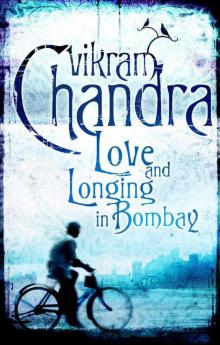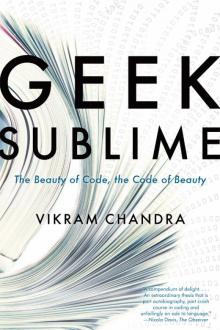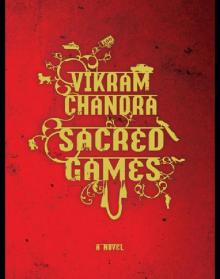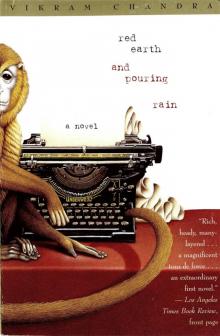- Home
- Vikram Chandra
Geek Sublime Page 2
Geek Sublime Read online
Page 2
My first response to Graham’s programmers-as-artists maneuver was as exasperated as Ceglowski’s, but after the initial irritation had passed I began to think about the specific aesthetic claims Graham was making for code, about what kind of beauty code might possess, and why Graham would want to claim the mantle of artistry. Programmers already are famous, rich, influential. Why do they need any other auras? Ceglowski has a theory:
Great paintings … get you laid in a way that great computer programs never do. Even not-so-great paintings—in fact, any slapdash attempt at splashing paint onto a surface—will get you laid more than writing software, especially if you have the slightest hint of being a tortured, brooding soul about you …
Also remark that in painting, many of the women whose pants you are trying to get into aren’t even wearing pants to begin with … Not even rock musicians have been as successful in reducing the process to its fundamental, exhilarating essence.
It’s no surprise, then, that a computer programmer would want to bask in some of the peripheral coolness that comes with painting, especially when he has an axe to grind about his own work being “mere engineering.”19
Ceglowski’s evocation of the Picasso swagger natural to artists of course assumes that painters and rock-stars are charismatically male and women are (ideally) pants-less; that programmers are all men is such an obvious assumption that neither he nor Graham feels the need to qualify their assertions with a reference to gender. So it turns out—as always—that formulations of the aesthetic are embedded in specific histories and cultures of power, privilege, gender, and “cool.” This particular landscape of American programming is one to which I am a foreigner twice over; I am a writer from India, but I’ve worked professionally as a programmer in the United States. Fiction has been my vocation, and code my obsession.
2 LEARNING TO WRITE
I came to computers while trying to run away from literature. I first published fiction—a plotty little sci-fi story heavily influenced by Isaac Asimov—when I was twelve, in a student-run magazine at my boarding school in India. Until then, reading stories and telling them (mainly to myself) had been a reliable, profound pleasure and a desperately needed comfort. The shock of seeing my secret life made public, in print, thrilled into my awkward, nerdy soul. I was a stereotypically budding writer, thickly bespectacled, shy, bad at cricket, worse at field hockey. When fellow students—even some of the remote, godlike athletes who were the heroes of my school—stopped me in the corridors to talk about the story and praise it and ask for more, I knew I had found a way to be in the world, to be of it.
So I kept writing. I read and, in various classrooms, imbibed a strange mix of Victorian classics, the great twentieth-century fictions produced by the stalwarts of Hindi literature, and fragments of Sanskrit from the epics. The only American texts we were prescribed were abridged, bowdlerized editions of Tom Sawyer and Huckleberry Finn. But in our dormitories, in the school-wide trading system for leisure-time reading, the most avidly sought prizes were the now-forgotten Nick Carter novels, featuring an eponymous “Killmaster” for AXE, “the smallest and most deadly arm of American global [intelligence].”1 Nick Carter exuded a particularly American glamour. The riches of America gave him an endless supply of killing devices, to which he gave cool names: “Hugo,” a pearl-handled stiletto made by Benvenuto Cellini; “Pierre,” a minuscule gas bomb; and my favorite, “Tiny Tim,” a low-yield nuclear grenade. Nick Carter’s exploits with beautiful women were lingered over every thirty pages or so, in counterpoint to the killing, with a level of explicit detail that made James Bond seem fusty and prudish and, well, British. And our home-grown spies, who adventured chastely in Hindi on the pulpy gray paper of the jasoosis available at railway stations, were too unspeakably Third World-ish and provincial to pay even cursory attention to.
During one long summer vacation at home in Bombay, I dug through the stacks at a commercial lending library. I had already exhausted their stock of thrillers (at a rupee per book), then held off book drought for a couple of weeks with science fiction and westerns, before finding Hemingway at the back of a shelf. I was fourteen, had read some smatterings of what I didn’t know then was called “literary fiction”—Conrad, Heller, Tolstoy—but I wouldn’t have bothered with Hemingway if not for the charging lion on the cover of the paperback. That, and the décolletage of a distressed damsel and the very large rifle wielded by a hunter promised excitement, so I paid up and went home and read “The Short Happy Life of Francis Macomber.” Then “The Capital of the World.” And “The Snows of Kilimanjaro.” I felt something extraordinary, the dread and clipped despair of the stories, a complete concentration of my own attention, and somehow also a flowing wonder and delight. I’d known this feeling before, during performances of the Ramayana I’d seen as a child perched on my father’s shoulders, in moments of high Hindi-movie drama in darkened theaters, but I was now experiencing concentrated waves which I felt in my mind and my body: prickles on my forearms, a tingling at the back of my neck. I knew, even in that moment, that I didn’t understand everything the stories were doing, what they were about. I had no idea who this Hemingway was. And yet, here I was at our kitchen table in Bombay, entranced.
Thus began my encounter with American modernists. Through Hemingway, I found Fitzgerald, and Faulkner, and Hurston, and Wharton, and Eliot. After I left my boarding school and joined a college in Bombay, I switched to the “arts stream” and was able to study English literature, which comprised both British and American traditions. I wrote fiction, seriously and self-consciously, trying to work out what literature was and what it was meant to do. And I knew I wanted to go to America. That was where Gatsby had been written, and somehow that meant I needed to go there to be a writer. For my parents, I had more elaborate justifications, reasons that included the sheer ineptitude of many of the teachers who were supposed to be teaching me about literature, and the stupidity of the Indian educational system’s obsession with rote learning and exams. But really, at the root of it all was this inchoate love for a literature that was not mine. In those days, from inside the socialist bubble of the Indian economy, America was ineffably far away and glamorous and rich, and many of us wanted to go there. But usually people went as graduate students, and studied engineering or medicine. What I wanted was pretty much unheard of and unaffordable, but because of my parents’ astonishing generosity, and happenstance—my corporate-executive father was posted to Hong Kong and was suddenly being paid in dollars instead of rupees—I found myself in the promised land as a sophomore. I was a little dazed and very happy. This was the adventure I had dreamed about. I read, and I wrote.
I successfully avoided the question of how I was going to make a living until the summer after I finished my undergraduate degree (with a major in English, a concentration in creative writing, and a novella for an honors thesis). When I was forced to come up with an answer, it was film school: if I couldn’t sell screenplays, at least there was a thriving Indian film industry I could get a job in. I applied to the film department at Columbia University, and showed up a few months later on the fifth floor of Dodge Hall, driven not so much by clarity about what cinema could offer me, but by a profound uneasiness about what was on offer just a floor below in the writing program: a commitment to a life as a writer of fiction. It wasn’t just the paucity of money in the profession; I knew most writers had day jobs. But writing was difficult. Grueling in a different way from making movies, from having to deal with dozens of egos and schedules and weather fluctuations to get a single shot. Making fiction with resonance, with that endless, echoing depth of feeling I had found in Hemingway was very, very hard. Writing sentences felt like construction, and, also, simultaneously, a steady, slow excavation. You put each word in place, brick upon brick, with a shimmery sense of what the whole edifice would look like, the shape of the final thing. But each phrase was also a digging inward, an uncovering. You tunneled, dug, dug. On good days, you emerged from your labors tired but ha
ppy. On bad days you were left quivery, stupefied. There was risk and danger involved in this work. You always got strung out, ground down, strained thin. Ended up a little sad, maybe a little mad. Not a way to spend a life.
So, there I was in 1986, at film school, with the first semester’s tuition paid for and two hundred dollars in my bank account. On my second day in New York, I went looking for employment to Columbia’s job board and found a listing for “scribes.” Of course this was providential, I thought. I called from the first pay phone I could find, set up an interview, and didn’t ask what kind of scrivening they needed. No matter how dead-letterish the situation was, I wasn’t going to prefer not to.
The job, it turned out, was not mere copying—the company provided specialized secretarial services for doctors hired by medical insurance companies. We, the scribes, took the handwritten notes from doctors’ examinations and typed them up under their letterheads so that they could be submitted as legal statements when insurance claims were taken to court. We deciphered the handwriting, constructed full sentences out of the doctors’ telegraphese, inserted a lot of boilerplate text, and sent it off to the respective doctor to review and sign and submit. The work paid well over minimum wage, and I found I could do it in an automated haze which required almost no mental effort.
Three months after I began working, the company acquired its first personal computers (PCs) for us to work on. I had typed my papers and stories on a terminal attached to the huge mainframe computer at college, and had taken a couple of programming classes, which I thought were tepidly interesting—I was good at writing bubble sorts for lists of words, but it all seemed quite abstract, of no immediate practical purpose. The mainframe was controlled by a specialized cadre of tech-heads, and my access to it was distanced and narrow. Now, though, at my scrivener job, I had a computer I could play with.
I blazed through my assigned work (no more worrying about typos and omissions), propped up stacks of paper to signal that I was busy, and dove into the arcane depths of DOS. Here was a complete world, systems and rules I could discover and control. I could write little batch files to run commands to change directories and copy files. And the software we used to write the reports, WordPerfect, I could control that too, write clever macros to put in the date, to recognize my abbreviations for the medical jargon, to pop in whole paragraphs of text. And now any repetition of effort seemed like an insult. Spend half an hour writing a report that didn’t quite fit the standard format? No way. Screw that. I’d rather spend six hours tinkering with if-then-else routines in my report macro so it would support this specialized format too.
Soon I was the de facto tech-support guy for our little office, and was advising on future purchases of hardware and software. I bought computer magazines on the way home, and lusted after the monster PCs in the double-page photo spreads: more speed, bigger memory, huge hard disks. I wanted all these, but even on the decidedly low-end machines I had access to, there was an entire universe to explore. There were mysteries, things I didn’t understand, but there were always answers. If I tried hard, there was always a logic to discover, an internal order and consistency that was beautiful. And I could produce these harmonies, test them, see them work. When a program broke, when it did something unexpected, I could step through the code, watch the variables change, discover where I had made unwarranted assumptions, where the user had done something I didn’t expect, and then I could change, adapt, and run the code again. And when I fixed the code, when it ran, the victory coursed through my brain and body. I wanted to do it again.
I left New York with a taste for this wizardry and an idea for a novel. I’d figured out in fairly short order that the collaborative, cash-intensive business of filmmaking wasn’t a good fit for me. Being around people all day tired me out, not writing fiction made me ferociously cranky, and the ideas I had for screenplays required gargantuan budgets. The novel I wanted to write moved back and forth between the nineteenth and twentieth centuries, featured cavalry battles, a typing monkey, a character dismembering himself, and many other special effects that I could pull off myself, without a crew or funding. So I finally accepted my fate: a lifetime of fiction-making anxiety and possible poverty was what I was built for, and running about on a film set wouldn’t rescue me from writers’ demons. There was a fortifying relief in knowing this, and I went off to a couple of graduate writing programs to get on with the work. I did a year at the Writing Seminars at Johns Hopkins, and then moved on to the University of Houston.
I wrote my novel and lived the life of the itinerant graduate teaching assistant (TA), which meant many wonderfully tipsy, passionate highbrow conversations in low-end bars during post-paycheck fortnights and a steady decline in the quality and quantity of food thereafter. I was with my tribe, happy, writing steadily and hard, but clearly my revenue streams needed some new tributaries. Most of my fellow TAs had second teaching jobs, but these were poorly paid, and biweekly confrontations with towering stacks of freshman composition papers had engendered in me a bitter hatred for all students. I looked around for other writing work, and requested information from publishers of porn and romance novels. I was quite willing to do this honest, easy labor, but found that literary-novel-writing apparently exhausted my creative resources, which ran to about four hundred words a day and were subsequently incapable of delivering even formulaically heaving bosoms and thrusting rods.
I was saved by a fellow graduate student who had noticed my burgeoning geekiness. By now I was walking around campus with eight-hundred-page computer manuals tucked under my arm and holding forth about the video-game virtues of Leisure Suit Larry in the Land of the Lounge Lizards in the grad-student lounge. My friend asked me to help set up her new computer, and I arrived at her house with a painstakingly curated collection of bootlegged programs and freeware utilities and an extra-large bottle of Diet Coke. She just wanted to be able to write short stories and print them out, but one of the preeminent signs of computer mania is a fanatical exactitude, a desire to have the system work just so. I tricked out her machine, emptied my bottle of soda, and then gave her my standard lecture about on-site and off-site backups and the importance of regular hard-disk checks and defragging. She looked a bit overwhelmed, but a couple of weeks later she called to ask if I would help a friend of hers, the owner of a local bookstore, with his new computers at the shop. “They’ll pay you,” she said.
Pay me? For letting me play with their new machines, no doubt still boxed and unsullied and ripe for my superior setup skills? This seemed incredible, but I gathered myself and said, “Sure, sounds good.” This was the beginning of a busy and profitable career as an independent computer consultant, which in short order led to paid programming gigs. As many consultants and programmers do, I learned on the job—if I didn’t know how to do something, Usenet and the technical sections of bookstores pointed me in the general direction of a solution. I was fairly scrupulous about not billing clients for the hours spent educating myself, more from a desire not to overprice my services than moral rectitude. I did provide value—word of mouth gave me a growing list of clients, and I was able to raise my hourly rate steadily.
I set up computers for elegant ladies in River Oaks and gave them word-processing lessons; I went out to factories and offices in the hinterlands of Houston to observe assembly lines and then modeled workflows and production processes. The programming I did was journeyman work; I mostly wrote CRUD applications, menu-driven screens that let the users Create, Retrieve, Update, and Delete records that tracked whatever product or service they provided: precision-engineered drill parts for high-heat applications, workers for the oil industry, reservations at restaurants. Simple stuff, but useful, and I always felt like I was learning, and making good money, sometimes even great money. I could afford biannual trips to India. Programming in America paid for my research and writing. I managed to get through graduate school without taking any loans, finished my novel, found an agent.
After the novel was
published, I accepted a university teaching job in creative writing, and finally gave up the professional freelance computer work. It had served me well. Now it was time to write.
I found, soon enough, that although I may have stopped chasing the fat consulting paychecks, the impulse to program had not left me. The work of making software gave me a little jolt of joy each time a piece of code worked; when something wasn’t working, when the problem resisted and made me rotate the contours of the conundrum in my mind, the world fell away, my body vanished, time receded. And three or five hours later, when the pieces of the problem came together just so and clicked into a solution, I surfed a swelling wave of endorphins. On the programming section of Reddit, a popular social news site, a beginner posted a picture of his first working program with the caption, “For most of you, this is surely child [sic] play, but holy shit, this must be what it feels like to do heroin for the first time.”2 Even after you are long past your first “Hello, world!” there is an infinity of things to learn, you are still a child, and—if you aren’t burned out by software delivery deadlines and management-mandated all-nighters—coding is still play. You can slam this pleasure spike into your veins again and again, and you want more, and more, and more. It’s mostly a benign addiction, except for the increased risks of weight gain, carpal tunnel syndrome, bad posture, and reckless spending on programming tools you don’t really need but absolutely must have.
So I indulged myself and puttered around and made little utilities, and grading systems, and suchlike. I was writing fiction steadily, but I found that the stark determinisms of code were a welcome relief from the ambiguities of literary narrative. By the end of a morning of writing, I was eager for the pleasures of programming. Maybe because I no longer had to deliver finished applications and had time to reflect, I realized that I had no idea what my code actually did. That is, I worked within a certain language and formal system of rules, I knew how the syntax of this language could be arranged to affect changes in a series of metaphors—the “file system,” the “desktop,” “Windows”—but the best understanding I had of what existed under these conceptualizations was a steampunk-ish series of gearwheels taken from illustrations of Charles Babbage’s Difference Engine. So now I made an attempt to get closer to the metal, to follow the effects of my code down into the machine.

 Love and Longing in Bombay
Love and Longing in Bombay Geek Sublime
Geek Sublime Sacred Games
Sacred Games Red Earth and Pouring Rain
Red Earth and Pouring Rain